4. THE BIRTH OF THE AMERICAN REPUBLIC

CHRISTIAN FOUNDATIONS
| CONTENTS
 The strong Chrisitan component in the discussions The strong Chrisitan component in the discussions
 Ben Franklin's reminder Ben Franklin's reminder
 The Framer's Christian take on the issue The Framer's Christian take on the issue
 Comparing the American and French efforts at Republic-building Comparing the American and French efforts at Republic-building
The textual material on this webpage is drawn directly from my work
America – The Covenant Nation © 2021, Volume One, pages 146-156.
|
THE STRONG CHRISTIAN COMPONENT
IN THE DISCUSSIONS |
|
The example also of Ancient Israel
These men were also aware of
another example of an ancient people who had tried to be self-ruling,
similar to what the Americans were trying to do. These constitutional
Framers were quite well read up on the Bible and were very aware of the
sad record of the ancient Israelites in their efforts to stay a strong,
yet free people. Indeed, as Christians, the Framers were very well
aware that human sin (pride, jealousy, lust for power, etc.) stood as a
constant threat to any effort to empower a central authority.
 For generations, God alone was ancient Israel's
sovereign. The Israelites had called on him time and again to protect
and preserve them against their enemies – foreign and domestic. But
their loyalties to God were most unsteady. Finally at one point, the
people called out to their spiritual leader Samuel, "Give us a king."
They felt that they could be more successful as a people if they were
more like the other nations around them, ruled not by some invisible
God but by a very visible, very politically impressive king. But
through the counsel of Samuel, Israel was warned by God himself that
their effort to have a government like other nations would be their
downfall. But they wanted a king to rule over them nonetheless. And so
God gave them a king. But as Samuel had predicted, in this move away
from God the Israelites soon fell under the political tyranny of their
kings. The kings took away the Israelites' liberties and amassed
considerable wealth and power of their own at the expense of the
people. For generations, God alone was ancient Israel's
sovereign. The Israelites had called on him time and again to protect
and preserve them against their enemies – foreign and domestic. But
their loyalties to God were most unsteady. Finally at one point, the
people called out to their spiritual leader Samuel, "Give us a king."
They felt that they could be more successful as a people if they were
more like the other nations around them, ruled not by some invisible
God but by a very visible, very politically impressive king. But
through the counsel of Samuel, Israel was warned by God himself that
their effort to have a government like other nations would be their
downfall. But they wanted a king to rule over them nonetheless. And so
God gave them a king. But as Samuel had predicted, in this move away
from God the Israelites soon fell under the political tyranny of their
kings. The kings took away the Israelites' liberties and amassed
considerable wealth and power of their own at the expense of the
people.
The Protestant component
This was exactly
what the American colonists had felt had come to pass with the English
kings. The English kings had
tried to take the place in the life of the nation that belonged only to
God. This effort of the kings to play God, claiming Divine Rights to do
so, was what had finally prompted their revolt, their War of
Independence. All Americans, as Protestant Calvinists (New England
Congregationalists, Reformed Dutch, Middle Colonies Presbyterians,
etc.), Baptists, Quakers and even as Church of England vestrymen, well
understood that they too had Divine Rights which no king had the right
to disregard or trample on.
Indeed, in one form or another nearly all of those
who assembled to draft this new venture into republican government were
Christians, Protestant Christians. They were politically informed by
their own sense of the longer history of the Church. Protestantism was
very aware of the fact that prior to the adoption of Christianity by
the Roman emperors in the 300s, Christianity had been a free religion,
under no central political control, but self-governing by small
communities of believers themselves in accordance with their strongly
Christian moral consciences and ingrained spiritual beliefs. The
Christians of the first three centuries of the Church had survived
terrible persecution from the Roman political authorities and yet not
only had kept themselves together as a people but had grown rapidly at
the same time. Pure Christianity needed no hierarchical authority to
organize and direct the faith of the true believer.
 But with the conversion of Roman Emperor
Constantine to Christianity in the early 300s, Christianity had become
Romanized, that is brought under the political organization and
protection of the Roman political hierarchy. From the Protestant point
of view, this was a horrible step backward for the Christian faith, for
this development made the faith henceforth a matter more of the
political interests of the politically powerful than that of the
personal faith of the individual believer. Protestantism was fiercely
sensitive on this subject. But with the conversion of Roman Emperor
Constantine to Christianity in the early 300s, Christianity had become
Romanized, that is brought under the political organization and
protection of the Roman political hierarchy. From the Protestant point
of view, this was a horrible step backward for the Christian faith, for
this development made the faith henceforth a matter more of the
political interests of the politically powerful than that of the
personal faith of the individual believer. Protestantism was fiercely
sensitive on this subject.
Thus the Framers tended to be strongly
anti-hierarchical in both their religion and their politics. The
Puritan-Protestant predecessors of the Framers had lived in terror of
the forced Catholicizing of England which the Catholic powers of Europe
(principally their perpetual enemies Spain and France) sought to
promote. The sending of the Spanish Armada to England in 1588 was
loudly justified by Spanish King Philip II as a result of God's command
to him as Defender of the Faith to bring the English back to the True
Faith (Catholicism) – by force if necessary.

Philip II
The humiliating defeat of Philip's mighty naval
Armada therefore ranked not only as a victory for English independence
but also as victory in the defense of their Protestant faith. This
conflict with the Spanish consequently left an even deeper dislike of
hierarchical Catholicism among Protestant Englishmen. In part, the
Glorious Revolution in England a century later was prompted by the
evidence that English King James II was secretly Catholic in loyalties
and planning an alliance with Catholic France to crush the power of the
highly Protestant English Whigs who controlled Parliament.
 James II
James II
Protestantism as political culture
Thus
the Protestant faith of the English colonists was a matter of great
political, economic and social importance to them. Their personal
freedom and their religious faith were to them inseparable items. As
Protestants they chose their own pastors, elected their own elders and
deacons to manage their local congregations, read and interpreted their
Bible readings on their own – without a priest performing that function
for them – and came to their own opinions on theological matters
themselves as a matter of their basic rights. This was a matter of
great personal distinction to them.
 Indeed, not only was the idea of having their
lands to the West put under Catholic hierarchical authority that
reached to Rome – but also the idea (which was being discussed openly
by King George III) of putting the English colonies under the authority
of the Anglican bishops (which the king himself personally supervised)
had been one of the underlying reasons they finally declared their
independence from the English king in 1776. Indeed, not only was the idea of having their
lands to the West put under Catholic hierarchical authority that
reached to Rome – but also the idea (which was being discussed openly
by King George III) of putting the English colonies under the authority
of the Anglican bishops (which the king himself personally supervised)
had been one of the underlying reasons they finally declared their
independence from the English king in 1776.
Their Protestant faith registered itself not only
in terms of the things they opposed (namely, hierarchically-controlled
religion) but the things they aspired to. Their republican instincts
were shaped strongly by the way their churches operated. Their church
officers were elected by the congregation on a regular basis and, at
least on the part of the very strong Presbyterian component among them,
they even developed regional representative government in the form of
their Synods (Senates) attended by pastoral and lay representatives.
Ultimately, community life, both religious and civil – by long
established habit – was to their understanding always governed from the
ground up, not the top down. They strongly conceived of government as
being collegial rather than hierarchical. Generations of them had lived
and died for this principle. They would have it no other way.
|
|
God as the guarantor of the success of America's new Republic
Indeed, the constitutional Framers who gathered at Philadelphia in 1787
saw themselves and their challenge very much operating within the
context of God's will. They were very well aware that God Almighty,
which in the fashion of the times they often referred to as
"Providence" as in "The One Who Provides," was the one empowerment that
had enabled them recently to succeed in their very risky revolt. Apart
from the direct – and frequent – assistance from God, it would have
been highly unlikely that a handful of mere commoners could have ever
succeeded on their own in a revolt against a powerful king and his
army.
They knew well, and testified often to the fact,
that only God had made the success of the American revolt possible.
They all understood that it was not the size of the American army, nor
the cleverness of their generals – but it was the hand of God operating
among them that had brought them successfully through these trying
times.
Ben Franklin's reminder
 At one point in
late June of 1787, during the heated debates in Philadelphia over what
kind of government they had been commissioned to create, Ben Franklin
arose to address the assembly, with a proposal that seemed amazingly
out of character for this great champion of earthly wisdom – namely,
that the group should start each of its daily deliberations in prayer: At one point in
late June of 1787, during the heated debates in Philadelphia over what
kind of government they had been commissioned to create, Ben Franklin
arose to address the assembly, with a proposal that seemed amazingly
out of character for this great champion of earthly wisdom – namely,
that the group should start each of its daily deliberations in prayer:
Mr. President
The small progress we have made after 4 or five
weeks close attendance & continual reasonings with each other, our
different sentiments on almost every question, several of the last
producing as many noes and ays, is methinks a melancholy proof of the
imperfection of the Human Understanding.
We indeed seem to feel our own want of
political wisdom, some we have been running about in search of it. We
have gone back to ancient history for models of Government, and
examined the different forms of those Republics which having been
formed with the seeds of their own dissolution now no longer exist. And
we have viewed Modern States all round Europe, but find none of their
Constitutions suitable to our circumstances.
In this situation of this Assembly, groping as
it were in the dark to find political truth, and scarce able to
distinguish it when presented to us, how has it happened, Sir, that we
have not hitherto once thought of humbly applying to the Father of
lights to illuminate our understandings?
In the beginning of the Contest with G.
Britain, when we were sensible of danger we had daily prayer in this
room for the divine protection. Our prayers, Sir, were heard, and they
were graciously answered. All of us who were engaged in the struggle
must have observed frequent instances of a Superintending providence in
our favor. To that kind providence we owe this happy opportunity of
consulting in peace on the means of establishing our future national
felicity. And have we now forgotten that powerful friend?
I have lived, Sir, a long time, and the longer
I live, the more convincing proofs I see of this truth that God governs
in the affairs of men. And if a sparrow cannot fall to the ground
without his notice, is it probable that an empire can rise without his
aid?
We have been assured, Sir, in the sacred
writings, that except the Lord build the House they labour in vain that
build it. I firmly believe this; and I also believe that without his
concurring aid we shall succeed in this political building no better
than the Builders of Babel: We shall be divided by our little partial
local interests; our projects will be confounded, and we ourselves
shall become a reproach and bye word down to future ages. And what is
worse, mankind may hereafter from this unfortunate instance, despair of
establishing Governments by Human Wisdom and leave it to chance, war
and conquest.
I therefore beg leave to move, that henceforth
prayers imploring the assistance of Heaven, and its blessings on our
deliberations, be held in this Assembly every morning before we proceed
to business, and that one or more of the Clergy of the City be
requested to officiate in that service.
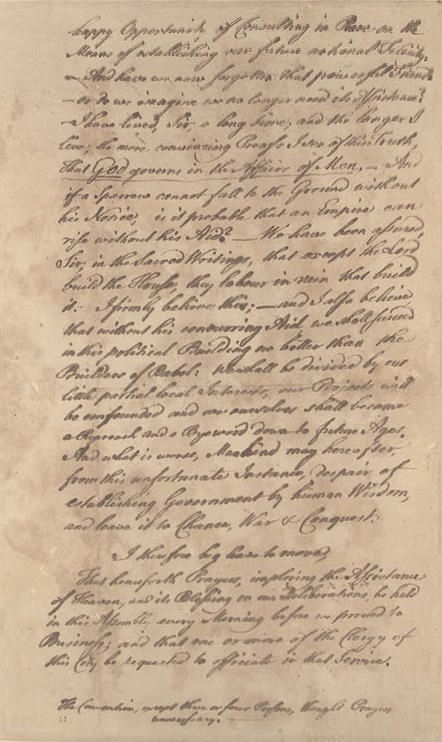
page 2 of Franklin's call for prayer
And thus Franklin, the widely respected voice of
American pragmatic wisdom, summed up the situation that faced the
designers of America's new political system.
Madison, who recorded the events of the Convention
(including Franklin's speech), noted that the motion was seconded by
Roger Sherman, but met by a concern (voiced by Alexander Hamilton) that
in taking up this policy at this late date in the process, people would
interpret this resolution as merely the result of the embarrassments
and dissentions among the delegates (which was indeed the case).
Randolph of Virginia then came to the support of the Franklin proposal
with a motion of his own specifying how this resolution was to be
enacted. But the business of the day ended without any vote on
Randolph's motion.
We cannot state that the Constitutional Convention
at this point then turned itself into a gathering of some kind of
saintly religious synod. But clearly all present understood the
significance of what Franklin had just brought to their attention. In
the end what would guarantee the wisdom and durability of this
constitutional enterprise rested ultimately not on the flawed and
contentious wisdom of man, but instead on the mercies of the God that
Provides for his people, especially in guiding their thoughts and
actions.
Furthermore, the matter at hand was not just one
of providing the thirteen states with some kind of political formula
for cooperation, but was (as it had always been) that of building a
test society, a demonstration model founded specially to give hope to
all mankind that a people's government was not only possible, but was
also able to stand strong against forces that would like to return the
little people, the commoners of the earth, back under the domination of
the high and mighty. Thus there could be no failure in this important
enterprise.
Franklin
Benjamin Franklin was a very complex individual, witty, even a bit of a
showman, a journalist and publisher, a scientist and inventor, a
skilled politician and diplomat, and a philosopher possessed of a folk
wisdom that cut through folly and conceit in order to bring authentic
understanding of life to light. He was a strong Christian, but never
dogmatic in his beliefs so that one could therefore identify him with
this or that particular religious group. Some identified him as a
Deist, who believed merely in some kind of Creator-God that simply
observed life from above – and that perhaps (maybe) controlled the
gates of Heaven, opening or closing them to a person at death depending
on that person's moral performance while on earth. But actually
Franklin's Christian faith varied widely over the course of his life,
from a very early negative reaction to the strict Puritanism of his
parents, to indeed something that looked like regular Deism, to an
interest in the power of passionate Christian revival to alter a
person's course in life, to an understanding that indeed God is very
active in the course of life for both individuals and societies. But in
any case, he was a very independent thinker on all subjects near and
dear to him (which were vast in scope). Certainly it was easy to
believe that he mostly was just a secular scientist focused primarily
in studying the mechanics of life (especially this matter of
electricity). Yet others could see in him a person seriously concerned
about the religious matters that were important to all Christians (or
Jews), but in such a way that Christians, ranging from Roman Catholics
to Quakers, could easily believe that he was definitely one of their
particular faith. The man was brilliant, a Humanist in the very best
sense of the word, not really a lofty or isolated Idealist but very
much the intensely involved Realist, and a person able to touch the
hearts of others in a way that truly stood him out as one of the Greats
of the Age.
He was born in Boston in 1706, the last male of
seventeen children born to his father and his two subsequent wives,
given formal schooling only until age ten, supposing himself headed to
the ministry. But at age twelve he took an apprenticeship in a printing
business run by an older brother, James. But at seventeen, Benjamin
broke from that relationship (an illegal act at the time) and escaped
to Philadelphia to work in printing shops there, before heading off to
London to do the same. A couple of years later he returned to
Philadelphia, where he not only resumed his work in the publishing
business but formed a discussion group (English coffeehouse style) of
young members that combined their libraries and engaged in far-ranging
discussions of social interest. Young Franklin was very interested in
public matters, and soon started up a series of newspapers that offered
commentary on the world around him, especially on the matter of what
brought societies to virtue and thus happiness, a theme that would
remain central to Franklin for the rest of his life.
In 1730 he took up a common-law relationship with
Deborah Read, whom he was not allowed to marry because she was already
married to a man that ran off with her money, never to be heard from
again. Franklin brought into that relationship a son, William, born to
him earlier by possibly another woman (or perhaps by Deborah herself?)
and a surviving daughter, who would accompany and look after her father
after her mother died. He and Deborah remained together until her death
in 1774.
 In 1733 Franklin began to publish his annual Poor Richard's Almanack,
offering advice on all sorts of daily matters, along with a multitude
of witty sayings that became catch-phrases of the day. The work (which
ran from 1732 to 1758) was very popular ... whose sales made the
Franklin family quite prosperous. In 1733 Franklin began to publish his annual Poor Richard's Almanack,
offering advice on all sorts of daily matters, along with a multitude
of witty sayings that became catch-phrases of the day. The work (which
ran from 1732 to 1758) was very popular ... whose sales made the
Franklin family quite prosperous.
But his curiosity about life and how it worked did
not stop there. He loved to experiment with better ways of doing
ordinary things, inventing multitudes of new objects along the way,
such as the Franklin stove, bifocals, an elaborate glass harmonica, but
especially things connected with the new idea of electricity (including
eventually the lightning rod, a dangerous venture which killed others
who tried to follow his lead). This latter interest soon had him
considered to be one of the leading scientists of the day, and he found
himself closely involved with the growing scientific community,
especially during his many extensive stays abroad in Europe.
He was no less an inventor in the field of
education, helping to develop in the 1750s a New-Model college
curriculum taught not by tutor generalists but by professional
specialists in different academic fields, and then to see this
curriculum put into play in the new King's College (ultimately,
Columbia University) and the College of Philadelphia (ultimately, part
of the University of Pennsylvania) – the latter which Franklin also
co-founded.
But it was in the field of politics that Franklin
would be best remembered. From the mid-1750s onward, Franklin spent
much time in London as a representative of the Pennsylvania Assembly,
in part to press the case against the autocracy of the Penn family
(Penn's descendants were less generous than their Pennsylvania
founder). But eventually his main concern would come to be over the new
taxes (especially the expensive government stamps required on all
publications) being imposed on the colonies by King George's Tory
Parliament. With his opposition to the 1765 Stamp Act, he became
well-known back in the colonies as a key advocate for a cause that
touched not only Pennsylvania, but all the colonies mutually.
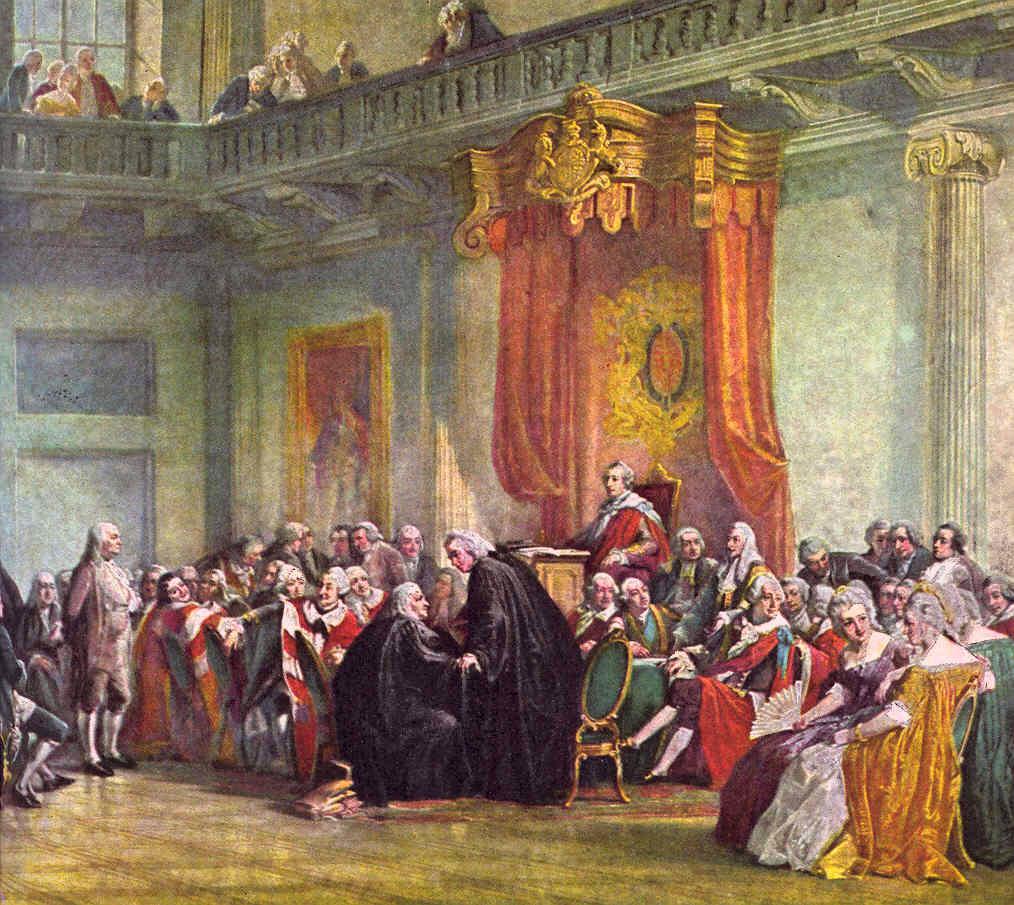
Franklin appearing before the King's Privy Council – 1774
But tragically this would put Franklin in deep
opposition to his son William, who by Franklin's own intervention had
been awarded the position as Governor of New Jersey. This royal
appointment was to make William a very strong Tory leader in the
colonies, at the same time that his father was becoming a leading voice
in the colonies' rising spirit of rebellion. The two would split over
this matter, never to be reconciled.
When Franklin returned finally from London in
1775, the rebellion had already begun, and Franklin was appointed as a
Pennsylvania delegate to the Second Continental Congress, where he was
also chosen to be a member of the five-man committee commissioned to
draft a Declaration of Independence.
 But then he was soon sent off to France (1776) to
be something of an ambassador to the French court for the new United
States. Here he not only worked hard to coordinate the French support
of the American rebellion (and its needs for French soldiers and
supplies), but he dazzled the French Court with his (purposely
stylized) rustic appearance and homespun wit and wisdom (John Adams,
who was there with him at the time, found Franklin's folksy theatrics
totally distasteful!). Franklin would remain there throughout the War,
ultimately helping negotiate the Treaty of Paris (1783) in which the
British recognized the independence of the new United States of
America. Then Franklin returned to America in 1785, soon after he and
Adams were joined in Paris by the young Jefferson. This would bring
Franklin back in time to serve (as we have just seen) as a Pennsylvania
delegate to the Constitutional Convention being held in Philadelphia
over the summer of 1787. But then he was soon sent off to France (1776) to
be something of an ambassador to the French court for the new United
States. Here he not only worked hard to coordinate the French support
of the American rebellion (and its needs for French soldiers and
supplies), but he dazzled the French Court with his (purposely
stylized) rustic appearance and homespun wit and wisdom (John Adams,
who was there with him at the time, found Franklin's folksy theatrics
totally distasteful!). Franklin would remain there throughout the War,
ultimately helping negotiate the Treaty of Paris (1783) in which the
British recognized the independence of the new United States of
America. Then Franklin returned to America in 1785, soon after he and
Adams were joined in Paris by the young Jefferson. This would bring
Franklin back in time to serve (as we have just seen) as a Pennsylvania
delegate to the Constitutional Convention being held in Philadelphia
over the summer of 1787.
|
THE
FRAMERS' CHRISTIAN TAKE ON THE ISSUE |
|
The Framers understood the dangers of building only on
ever-changing human logic ... rather than on
permanently-established basic law
Franklin's appeal registered itself as strongly as it did because all
present knew well the Biblical story of the Fall of Adam and Eve from
God's Paradise. Adam and Eve had ignored God's warning not to eat from
the Tree of the Knowledge of Good and Evil (human logic), but instead
had followed the Serpent's advice to do exactly that because it would
make them be "like God." The temptation to play God by assuming for
themselves the knowledge of Good and Evil was too great for Adam and
Eve to resist. But in breaking that command, disaster struck. What they
got for their efforts was only a half-truth (the most dangerous of all
lies). Apart from the fundamental guidance of God, their logic could
not guide them except in merely self-justifying circles. It did not
produce true knowledge. Their logic was only technique – not Truth
itself.
Truth came from a deeper source of life – from a
depth that human logic itself could never reach. Only a close, fully
trusting relationship with the Author of Life – and Life's basic Truths
as God ordained them – offered true knowledge. But by their
disobedience, by their questing for knowledge apart from God, Adam and
Eve had ruptured that vital relationship. They were on their own with
their own sophistication (as in the sophistication of the Sophists of
Ancient Athens). But this sophistication only made them all the more
aware of life's shortcomings, especially in others, whom they blamed
for their problems. Ultimately this broken relationship with God ended
in death – their death. Not a pretty picture!
The Framers understood very well the moral of that
story: human logic was not the answer to life's challenges.
Relationship, holding together in a spirit of unity, and holding to God
as the ultimate judge and ruler of life, was the path they needed to
follow. The better way would come if they were willing to submit their
particular self-interests, and the moral and tactical logic man used in
defense of those self-interests, in support of the greater bond that
held them together as Americans – Americans under God.
What they ultimately formulated as their new
American government was a rather simple alliance system that encouraged
them to work together without according too many powers to the system
itself. This new federal system was their response to the challenge.
Even then they knew that this new system would
work only if man's hunger for power (as in Adam and Eve's desire to
play God) was held in check. A deep respect for – and even fear of –
God among the people was the only way they felt that things might stay
on course as they faced the many challenges ahead of them. This was a
component missing in the logical systems of the philosophers, ancient
and modern. It was not missing in the thinking of the Framers of the
Constitution. In fact it held a central or foundational place in their
understanding of things.

For my own part, I sincerely
esteem it [the Constitution] a system which without the finger of God,
never could have been suggested and agreed upon by such a diversity of
interests. Alexander Hamilton – 1787

Of
all the dispositions and habits which lead to political prosperity,
Religion and Morality are indispensable supports.
. . . And let us with caution indulge the supposition that morality can
be maintained without religion. . . . Reason and experience both forbid
us to expect that national morality can prevail in exclusion of
religious principle. George Washington – Farewell Address, 1796.

We
have no government armed with power capable of contending with human
passions unbridled by morality and religion. Avarice, ambition,
revenge, or gallantry, would break
the strongest cords of our Constitution as a whale goes through a net.
Our Constitution was made only for a moral and religious people. It is
wholly inadequate to the government of any other. John Adams – to the Massachusetts Militia, 11 October 1798.

The
belief in a God All Powerful wise and good, is so essential to the
moral order of the world and to the happiness of man, that arguments
which enforce it cannot be drawn from too many sources nor adapted with
too much solicitude to the different characters and capacities to be
impressed with it. James Madison – Letter to Frederick Beasley, November 20, 1825
COMPARING THE SIMULTANEOUS AMERICAN AND FRENCH EFFORTS AT REPUBLIC-BUILDING |
|
Contrast the American approach to self-government in 1787 with the
French Revolution which broke out two years later in 1789 – just as the
American Constitution went into effect.
The French were led simply by their belief in the power of human reason
or logic – especially their own logic (that is, the logic of their
political leaders) – which they supposed would produce a Platonically
perfect French Republic.
Tragically, the leaders of the French Revolution had only
bright ideas – and no practical or deeply tested experience in guiding
and directing a society. Nor did the French people themselves have any
understanding of what their role was to be in this new Revolutionary
society.
God played no part in the plans of the French
reformers. Indeed, their mood was generally hostile to the idea of God
(whom they frequently mocked), for they understood liberty as freedom
from religion. They viewed religion, the Christian faith in particular,
as a key component of the very Old Order that they were bent on
overthrowing. They were determined to be ruled not by God but by man –
by man's basic ability to do the right thing, the logical thing.
By way of complete contrast, the Framers were well
aware of the dangers of trusting to merely self-justifying Human Reason
to direct them. They were quite aware that God – whose rules for
human behavior were as eternal as the laws of physics and chemistry –
had to stay sovereign over these United States, or they too would drift
down the "creative" or "progressive" path of Human Reason that the
French Revolutionaries had foolishly taken up.
Totally unsurprisingly to the more pragmatic
Americans, when the French intellectuals attempted to put their
"enlightened" political philosophy to practice – they found themselves
unable to agree among themselves as to what exactly constituted the
right thing, the reasonable, or logical thing. One man's logic was not
another man's logic.
Soon they fell from their Idealism into mutually
hostile intellectual camps. Consequently, the Revolution quickly
collapsed into a murderous chaos. At first
they kept the guillotine busy beheading the old ruling class of the Ancien R gime:
France's king and queen, its barons and aristocrats, its bishops and
clergy, etc. But having overthrown the Old Order ... they could
not agree on what the New Order should look like.
It was at this point that the leading
revolutionary groups, the Girondins and Jacobins, savagely turned on
each other over points of differences in their "pure" thinking ...
sending each other to the guillotine! And thus France fell into a very
bloody period, especially during the years 1793-1794, a period known
today as the French "Reign of Terror." And so it was that the French
"enlightened ones" themselves became the victims of their own
Revolution.

It finally took the dictatorship of Napoleon
(1799-1815) to bring the French under some kind of political order. It
required a new form of tyranny to rescue them from the tyranny of
unrestrained human self-interest – and the reason or logic used to
justify such self-interest.
So much for human Reason and the Idealistic belief
that man's Reason opened the way to some kind of absolute Truth and
Goodness! Yet it would be a sophisticated belief that would never seem
to die, despite the ugly historical record of man's continuing attempts
to build utopias on the basis of human Reason alone.
By way of strong contrast, the Framers of the
Constitution were very aware of such potential dangers.1
Thus the
American "Revolution" they presided over, highly suspicious of
unrestrained human behavior and thus cautiously minimalist in its
utopian efforts, succeeded awesomely in creating a viable republic –
one loaded with many checks and balances in its distribution of various
governmental powers.
And thus it was that the American constitution-building effort
would succeed brilliantly ... to the same extent that the French
Revolution failed miserably.
1Except
probably Jefferson, who anyway was away during the drafting of the new
Constitution, serving as America's Minister (Ambassador) to France
(1785–1789). In Paris, he was wholly enraptured by the reformist spirit
of the French philosophes (intellectuals or philosophers), a spirit
which was clearly driving France toward revolution. Jefferson, being
himself a utopian idealist, long remained a devout defender of the
French Revolution, which finally broke out in 1789 (just before he
returned to America). Indeed, he was one of the last to finally admit
that the murderous Reign of Terror into which France soon fell had
tragically betrayed the original high ideals of the French utopian
philosophers he once so greatly admired.
|

The execution of French King Louis XVI – January 21, 1793
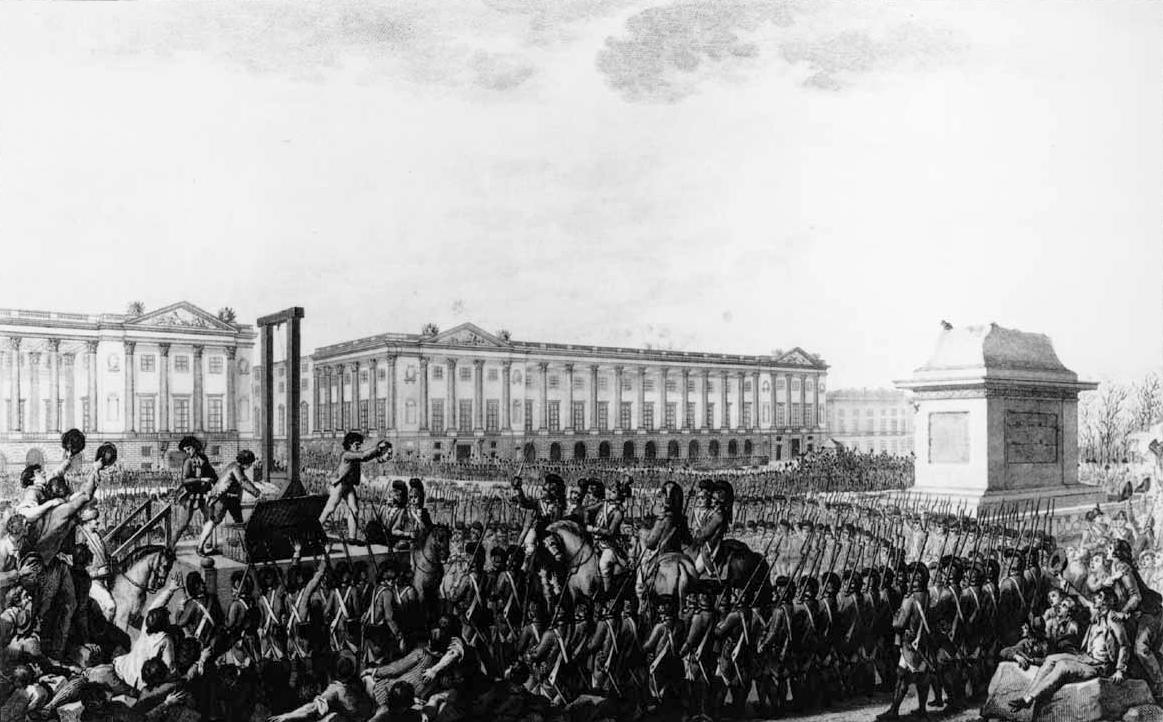
... setting off a realm of mass executions ... first of the French nobility and clergy, then descending down into mutual slaughter of opposing revolutionary groups: Jacobins vs. Girondins
Leaders of the French Revolution
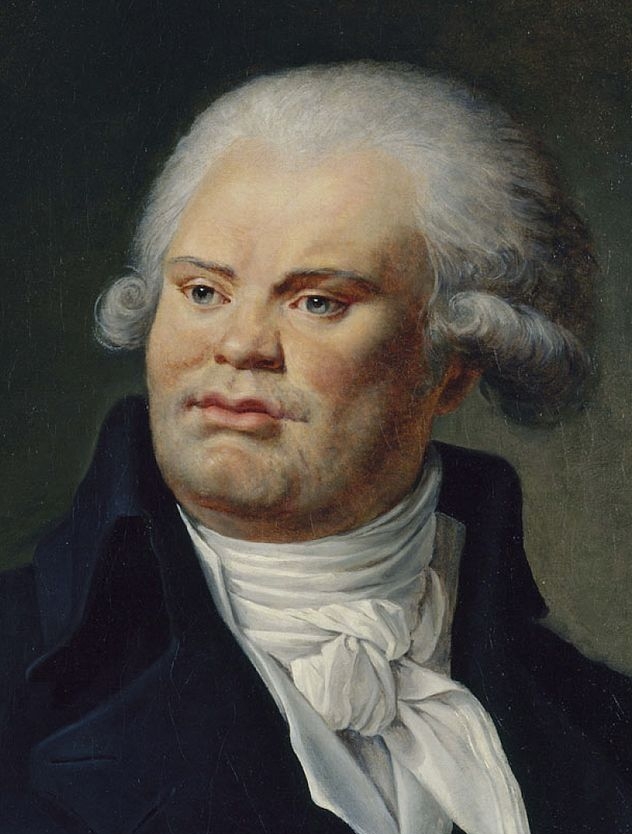
Georges-Jacques Danton, early Girondin leader
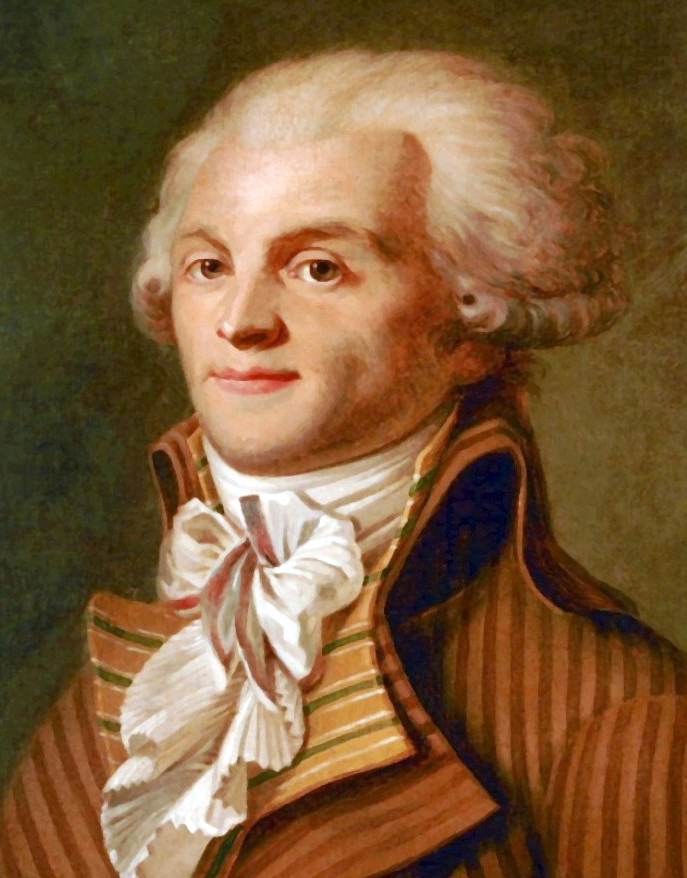
replaced by the more radical Jacobin, Maximilien Robespierre
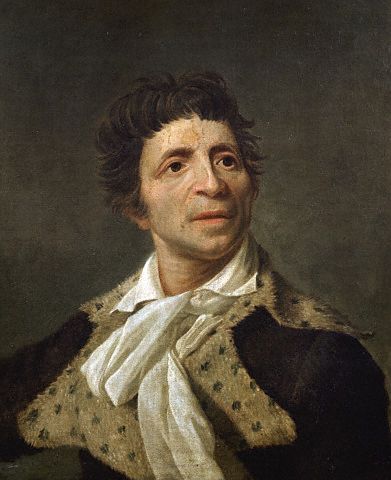
and the Jacobin sociopath Jean-Paul Marat ...
who used to make the list of those to be guillotined during the Reign of Terror
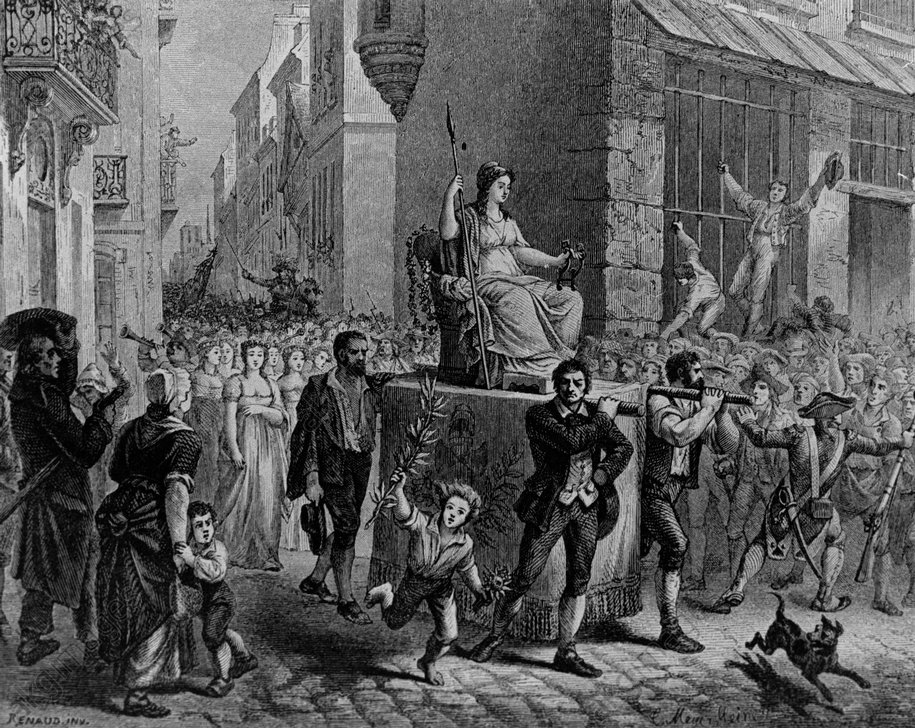
The Goddess of Reason, symbol of the new Cult of Reason (1793)
replacing France's traditional Catholicism. She is being led to the Cathedral Notre Dame where she will be placed at its altar as a sign of the new Age of Reason ... ironically at the same time that the French are slaughtering each other over points of "reason."
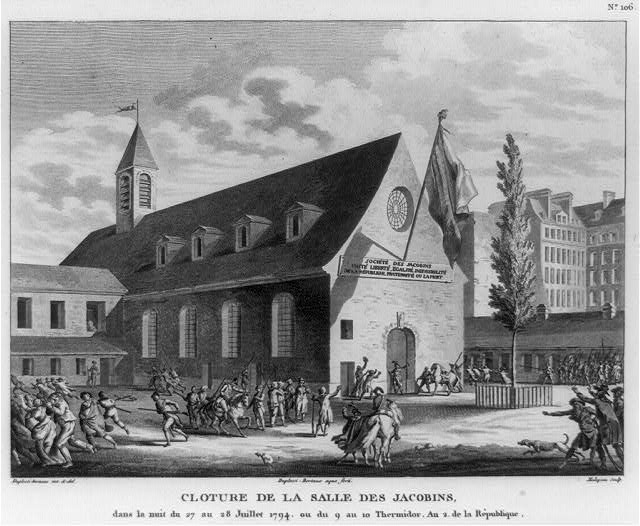
Jacobin headquarters during the height of the "Reign of Terror" (July 1794)
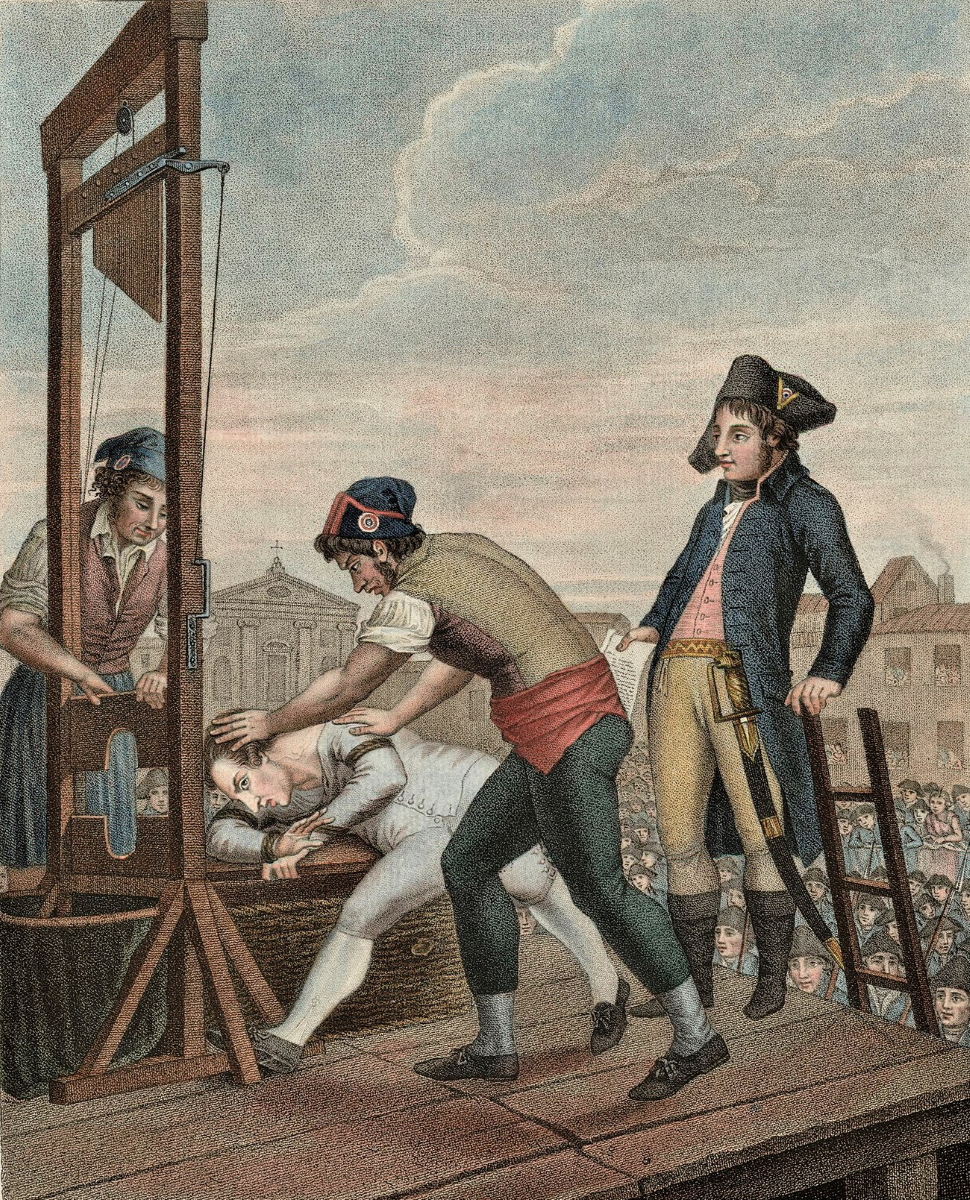
The mass-murderer Robespierre himself is finally guillotined (July 28, 1794)
... the beginning of the slowdown of the Reign of Terror
 The Emperor Napoleon Bonaparte (reigned 1799-1815) finally settles France down... before spinning the country outward in a campaign of European conquest
The Emperor Napoleon Bonaparte (reigned 1799-1815) finally settles France down... before spinning the country outward in a campaign of European conquest
 Miles H. Hodges Miles H. Hodges
| |









 But with the conversion of Roman Emperor
But with the conversion of Roman Emperor


 Indeed, not only was the idea of having their
lands to the West put under Catholic hierarchical authority that
reached to Rome – but also the idea (which was being discussed openly
by
Indeed, not only was the idea of having their
lands to the West put under Catholic hierarchical authority that
reached to Rome – but also the idea (which was being discussed openly
by 
















